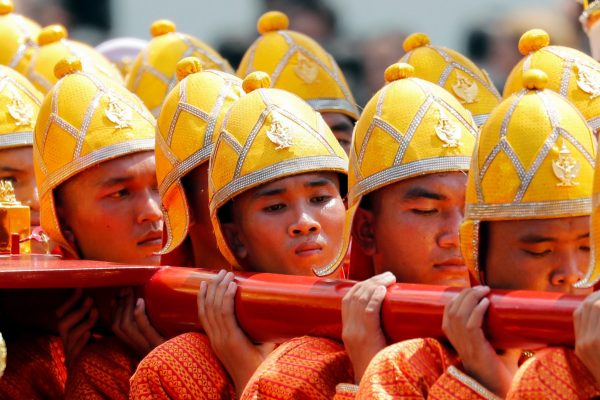King Bhumibol passed away in October 2016. The mourning period lasted for a year, and culminated in a royal funeral held in a public field opposite the Grand Palace. On 26 October this year, Bhumibol was finally cremated.
The revered King is remembered fondly in the collective memory of the Thai people. His departure was met with considerable anxiety about the arrival of the new and controversial monarch and the political instability that might accompany his transition into power.
Vajiralongkorn — Bhumibol’s son — ascended the throne less than two months after the death of his father. Some analysts predicted that Vajiralongkorn would be a weak king dominated by a strong army due to his lack of moral authority and divinity. But the new King has proved these pundits wrong.
Even before the passing of Bhumibol, Vajiralongkorn strove to remove his enemies from the palace — that is, those who had forged intimate ties with his father. He emasculated the Privy Council (once considered the engine behind the network monarchy) by withdrawing its main responsibility of advising the king.
The change within the Privy Council weakened the position of its President, General Prem Tinsulanonda. A former prime minister and army chief, Prem was known to be an arch-enemy of Vajiralongkorn.
The new King also requested to have the military-drafted constitution amended — despite it being approved in a public referendum — to allow him to decide for himself if he would appoint a regent while abroad. The revised provision enables the King to stay in Munich, where he prefers to spend most of his time nowadays, while still ‘ruling’ Thailand from afar.
Another important development within the palace was the amendment of the Crown Property Act, which gave Vajiralongkorn full control of the Crown Property Bureau (the agency that manages the multibillion-dollar holdings of the monarchy). The amendment was approved by the junta’s rubber-stamp legislature in July.
Undoubtedly, King Vajiralongkorn has embarked on consolidating his power with the backing of the military. It appears that Thailand’s two most prominent institutions — the monarchy and the military — have attempted to establish a constructive working relationship in order to entrench their respective political standings (at least during this critical royal transition period).
Outside the palace, the military (which still controls the government) has worked towards achieving two goals: eliminating its political enemies and legitimising itself as a political actor.
The new military-sponsored constitution has been designed to prevent major political parties like that of former prime minister Thaksin Shinawatra from returning to power. Consequently, the next election will be a largely orchestrated affair. The Senate is likely to be dominated by the army since certain seats are reserved for military generals. This explains why many Thais are not enthusiastic about the general elections scheduled for November 2018.
The opposition has also been directly targeted. Former prime minister Yingluck, who is Thaksin’s sister, escaped a jail term by preemptively fleeing the country. She was found guilty of negligence in a case related to a rice subsidy scheme and sentenced to a five-year imprisonment in absentia.
The pro-democracy wing of the pro-Shinawatra ‘Red Shirt’ movement has been harshly suppressed. Student activist Jatupat Boonpattararaksa (known as Pai Daodin) was imprisoned for sharing a BBC article on the biography of the new King. He was the only person imprisoned from among over 2000 social network users to have shared the content.
Yingluck’s politicised verdict and attacks against supporters of democracy in Thailand suggest grim prospects for reconciliation among all parties concerned.
In the meantime, the army has continued to empower itself through increasing the defence budget and purchasing new military equipment despite public criticism on this matter. Early in the year, the military government ordered 28 VT4 tanks and 34 VN-a armoured personnel carriers from China. It then signed a 12 billion baht (US$390 million) deal to buy a submarine from China in May. The payment will be made in instalments over seven years. Later, in June, it also purchased helicopters from the United States in deals that had been suspended by the 2014 coup.
With the military taking steps to enhance its staying power and the new and politically active monarch playing his own firm hand, the future of Thailand is undefined. 2018 will test the longevity of the interdependent relations between Vajiralongkorn and the military. If such longevity is guaranteed, Thai democracy will be shouldered with another setback.
Pavin Chachavalpongpun is associate professor at Kyoto University’s Center for Southeast Asian Studies.
This article is part of an EAF special feature series on 2017 in review and the year ahead.

